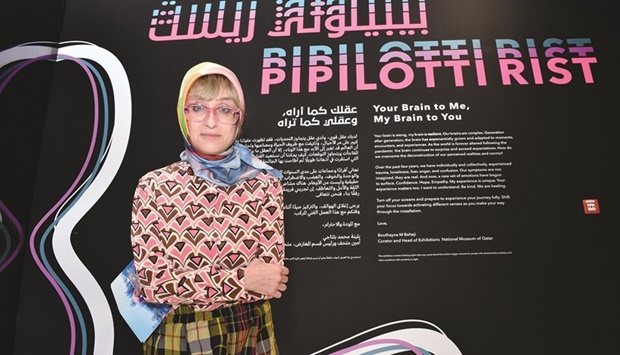Artists should be free to also make mistakes so as to become better, said renowned Swiss artist Pipilotti Rist as she puts a spotlight Qatar’s “young but very promising art scene”.
“It’s kind of young, it’s not like 100 years of history but it is very promising…. sometimes you have to make mistakes to become better, and every artist does" she said.
Rist, who is exhibiting her first museum installation in the Middle East at the National Museum of Qatar titled “Your Brain to Me, My Brain to You”, was sharing her view about the country’s burgeoning art scene.
The large-scale and unique artwork, organised in partnership with the Ministry of Public Health and the Hamad Medical Corporation, will be on view until December 20.
As one of the longest temporary exhibitions at NMoQ, the show – which highlights the importance of mental health – aims to provide residents and hundreds of thousands of football fans who will be coming for the FIFA World Cup Qatar 2022 the chance “to embark on a journey of self-discovery through a multisensory experience that inspires introspection and awe”.
About the installation, Rist said: “My work speaks on an emotional level and nevertheless I hope it is perceived as deep, and when people go in, there is the education (aspect) where the audience is invited to write down something, a sort of a statement.
“I hope it also contributes that when you’re in, you little bit forget your past and future and are more in the moment with the others and that is perceived as public space that belongs to everyone.
“It’s kind of young, it’s not like 100 years of history but it is very promising…. sometimes you have to make mistakes to become better, and every artist does" she said.
Rist, who is exhibiting her first museum installation in the Middle East at the National Museum of Qatar titled “Your Brain to Me, My Brain to You”, was sharing her view about the country’s burgeoning art scene.
The large-scale and unique artwork, organised in partnership with the Ministry of Public Health and the Hamad Medical Corporation, will be on view until December 20.
As one of the longest temporary exhibitions at NMoQ, the show – which highlights the importance of mental health – aims to provide residents and hundreds of thousands of football fans who will be coming for the FIFA World Cup Qatar 2022 the chance “to embark on a journey of self-discovery through a multisensory experience that inspires introspection and awe”.
About the installation, Rist said: “My work speaks on an emotional level and nevertheless I hope it is perceived as deep, and when people go in, there is the education (aspect) where the audience is invited to write down something, a sort of a statement.
“I hope it also contributes that when you’re in, you little bit forget your past and future and are more in the moment with the others and that is perceived as public space that belongs to everyone.

“My main goal, I wanted people to see themselves or remind them of certain moods and if they feel themselves mirrored, (saying that) ‘I think that is actually my brain’ or ‘that it is me there, that would be my main vision’”.
Described as a “pixel forest”, the installation comprises 12,000 LEDs (light-emitting diodes) strung on cables throughout the gallery for visitors to navigate.
Representing neurons, constantly firing and communicating with each other, the pulsing resin-encased bulbs have been programmed in choreography with a soundscape and featuring abstract footage of Qatar’s landscapes.
“It fits my practice because I think there is the medical (aspect) on one side but culture, like music… not only gives identity but also has a healing quality, calming, or contemplating and we need this to relax our minds and to take the soul seriously,” Rist added.
Described as a “pixel forest”, the installation comprises 12,000 LEDs (light-emitting diodes) strung on cables throughout the gallery for visitors to navigate.
Representing neurons, constantly firing and communicating with each other, the pulsing resin-encased bulbs have been programmed in choreography with a soundscape and featuring abstract footage of Qatar’s landscapes.
“It fits my practice because I think there is the medical (aspect) on one side but culture, like music… not only gives identity but also has a healing quality, calming, or contemplating and we need this to relax our minds and to take the soul seriously,” Rist added.


